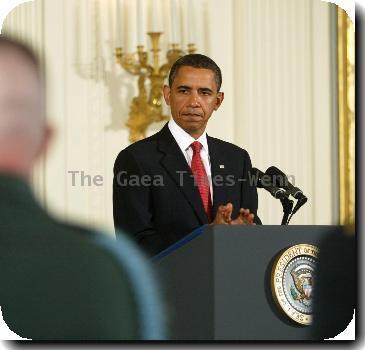AP source: Obama to announce loan guarantee for 1st nuclear plant in US in nearly 3 decades
By Ben Feller, APFriday, February 12, 2010
AP source: Obama to announce nuke plant loan
WASHINGTON — President Barack Obama next week will announce a loan guarantee to build the first nuclear power plant in the United States in almost three decades, an administration official said Friday.
The two new Southern Co. reactors to be built in Burke, Ga., are part of a White House energy plan administration officials hope will draw Republican support. Obama’s direct involvement in announcing the award underscores the political weight the White House is putting behind its effort to use nuclear power and alternative energy sources to lessen American dependence on foreign oil and reduce the use of other fossil fuels blamed for global warming.
Loan guarantees for other sites are expected to be announced in the coming months, the official said, speaking on the condition of anonymity because the decision had not yet been made public. The federal guarantees are seen as essential for construction of any new reactor because of the huge expense involved. Critics call the guarantees a form of subsidy and say taxpayers will assume a huge risk, given the industry’s record of cost overruns and loan defaults.
Even with next week’s announcement, actual construction of the first reactor is still years away. The Southern Co. has applied to the Nuclear Regulatory Commission for a construction and operating license for the plant, one of 13 such applications the agency is considering. NRC spokesman Eliot Brenner said the earliest any of those could be approved would be late 2011 or early 2012.
The Southern Co. has begun site preparation in Burke, but cannot begin construction without NRC approval.
Obama called for “a new generation of safe, clean nuclear power plants” in his Jan. 27 State of the Union speech, and followed that by proposing to triple loan guarantees for new nuclear plants. Obama’s budget for the coming year would add $36 billion in new federal loan guarantees on top of $18.5 billion already budgeted — but not spent — for a total of $54.5 billion. That’s enough to help build six or seven new nuclear plants, which can cost $8 billion to $10 billion each.
The proposed new reactors would generate power for some 1.4 million people and employ about 850 people, the official said, adding that the Georgia project would create about 3,000 construction jobs.
Spiraling costs, safety concerns and opposition from environmentalists have kept utilities from building any new nuclear power plants since the early 1980s. The 104 nuclear reactors now in operation in 31 states provide about 20 percent of the nation’s electricity. But they are responsible for 70 percent of the power from pollution-free sources, including wind, solar and hydroelectric dams that Obama has championed as a way to save the environment and economy at the same time.
During the campaign, Obama said he would support nuclear power with caveats. He was concerned about how to deal with radioactive waste and how much federal money was needed to support construction costs. Those concerns remain; some say they’ve gotten worse.
Environmentalists and fiscal hawks oppose new nuclear plants and note that they come at the same time Obama has proposed eliminating a long-planned nuclear waste dump at Yucca Mountain in Nevada. Obama has appointed a commission to find a safe solution for dealing with nuclear waste, but in the meantime the government has no long-term plan to store commercial radioactive waste.
Energy has served as a major plank of the president’s domestic agenda, but his focus on building a green energy economy has broadened in the past month to include nuclear power, offshore oil drilling and development of clean-coal technology, all energy sources championed by Republicans. The shift came after Republican Scott Brown won a special election in Massachusetts to replace the late Democratic Sen. Edward M. Kennedy, depriving Democrats of the votes needed to keep Senate Republicans from blocking their agenda.
Republicans like South Carolina Sen. Lindsey Graham welcome the shift, but some pro-nuclear Republicans remain nervous about the heart of the Obama-backed climate bill — a plan to limit heat-trapping pollution, which will raise energy costs.
Environmentalists, who once saw Obama as a friend of renewable energy, have said they feel betrayed by his shift. They said renewable energy such as wind and solar are more cost-effective than nuclear power and do not come with side effects such as radioactive waste.
Associated Press writers Matthew Daly and Philip Elliott contributed to this report.
Tags: Barack Obama, Energy, Energy And The Environment, Environmental Activism, Environmental Concerns, Geography, North America, United States, Utilities, Washington, Waste Management











